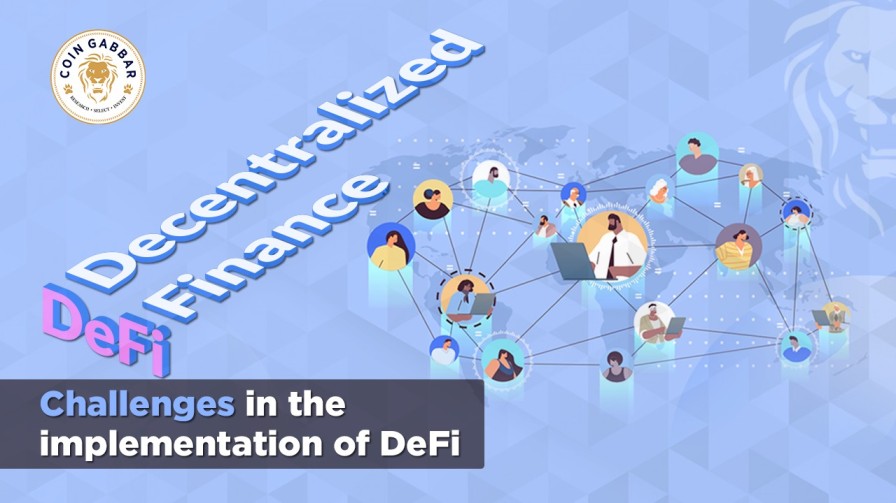Challenges in implementation of DeFi

The term DeFi has been in the limelight ever since Maker DAO gained popularity back in 2017. DeFi, or Decentralized Finance, is changing the way banks operate and are considered and heavily invested in by institutions like J.P Morgan and Morgan Stanley.
Since the boom of the crypto market, every bull run is supported by DeFi protocol, and in every bear run, when there is a severe liquidity crunch, the DeFi projects have come to the rescue.DeFi projects are an essential part of the growth of the crypto community. While writing this in the second week of August, there is around $60 Billion worth of assets locked for staking in different DeFi projects across chains like Ethereum and Binance Smart chain.
Understanding Decentralized Finance
DeFi is the financial wing of the blockchain world, and they are essentially banks managed by a DAO-based community. The goal of DeFi is to bring financial services more secure and accessible for everyone with an internet connection. DeFi ensures that there is no discrimination, injustice, or high cost in the process with an easy-to-use and open-source framework.
DApps or Decentralized Applications are blockchain-based applications that act as interfaces for such protocols; these Dapps are made via smart contracts, which then let users lock their tokens and earn via farming or staking. These tokens can be used for lending, liquidity, and many more purpose. These returns may vary from 5 to 50%, sometimes more, ranging from demand, strategy, and nature of tokens.
A sophisticated DeFi protocol essentially acts like a bank without intermediaries and costly physical infrastructure. This drastically drives down the cost the banks and the users face with traditional financing systems.
But DeFi is not ready to serve the whole world, primarily because of the security, lack of awareness, and scalability issues. So let us look at some of the problems that are hindering DeFi's adoption into the mainstream financial systems.
Major problems that the current DeFi industry is trying to solve
Security in smart contracts is self-executing contracts that are usually automated and triggered when the conditions are met. Smart contracts are algorithms developed on blockchain protocols or directly on a network. Smart contracts ensure that the transactions are seamless without the need for any centralized authority and intermediaries.
Overreliablity on oracles
Smart contracts rely on outside information like price feed from a crypto exchange. These third-party services that provide such connections are known as blockchain oracles. A contract may act out in case the connection is disrupted if not coded properly.
Scalability
Scalability is the biggest issue when it comes to any new disruptive technology; DeFi is no different. DeFi is based on financial technology, meaning the transactions should be faster and more secure than the current financial establishment. But the Ethereum network, where most of the notable DeFi projects are, carries out 15 transactions per second, and Visa, on the other hand, carries out 65K transactions per second. This obstructs the retail or real-world adoption of DeFi.
It is hard to tell if this issue will be solved, but Ethereum is shifting to the PoS consensus, which will lead to faster transactions with low transaction costs.
Transaction fees
The transaction process is very inconvenient with the current DeFi scenario; you need to have some Ethereum in your wallet if it's a protocol made on the Ethereum blockchain. This issue increases during the bull market when the price of Ethereum soars along with the congestion in the network. In many cases, it is good to have a little more than the transaction cost displayed in the swapping window because of slippage.
Security
Security is another concern in the current DeFi world since DeFi handles capital and locks funds for a predetermined period; hence security needs to be top-notch. DeFi projects are open-sourced and hence more open to vulnerabilities. Sometimes, the vulnerabilities are not in code but in algorithms; the lack of regulation and experts in the field may be the reason for many self-destructive projects.
The current DeFi scenario, while hot, still needs some significant improvements. DeFi is very promising since it brings control of the funds to the user, eliminates the middle man, and cuts unnecessary costs.
The concept of stablecoins and DAOs, both of which DeFi projects introduced, have revolutionized the blockchain world. In many cases, DeFi projects have started to change the world and have started to make a difference, like in NFT and GameF. The industry is now worth 100s of Billions of dollars and is the top choice of institutions and whale as the safer and more promising genre of crypto investing.